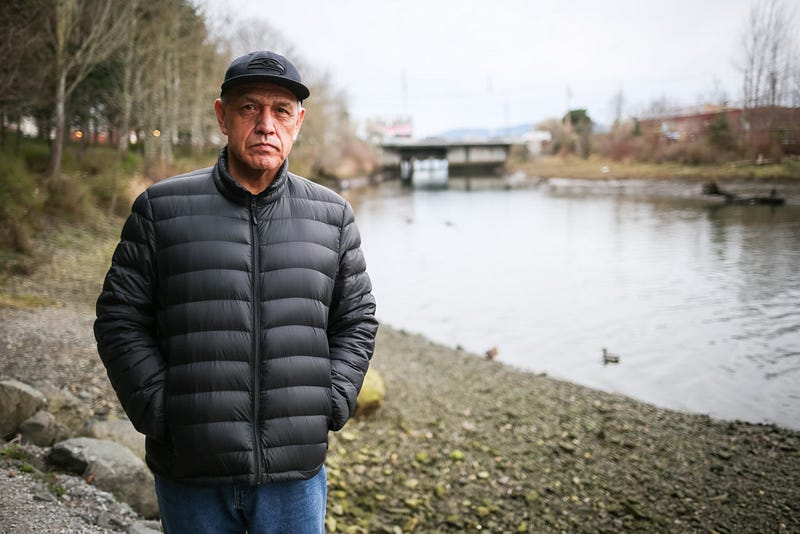A Walk Down Billy Frank Jr. Street
An account of Billy’s past and how he’s being remembered
STORY BY ANNE ELLIOT | PHOTOS BY NICK DANIELSON
Billy Frank Jr. Street
On a brisk November morning in 2015, a small group stood huddled on a Bellingham street corner to watch Indian Street become Billy Frank Jr. Street. Some were friends or relatives of Billy Frank, some only read about him in the papers, but all made it out to honor him that morning.
Bellingham City Council member Terry Bornemann proposed a street be named after Billy Frank Jr. last summer. A request for a Martin Luther King Jr. Street was considered, but Bornemann felt Native American civil rights were more relevant to the area. He saw the street change as an educational opportunity for those visiting Western to discover who Frank was and what he accomplished.
The same day Billy Frank Jr. Street was installed, President Barack Obama announced the Nisqually leader would be one of 17 recipients to receive the Presidential Medal of Freedom, the nation’s highest civilian honor.
“Finally we celebrate those who have challenged us to live up to our values,” Obama said. “He was spat on, shot at and chased, clubbed and cast as an outlaw. But Billy kept fighting because he knew he was right.”
Billy’s battle begins
In 1945 at age 14, Billy probably didn’t expect to be honored by the president as he was being dragged from his Nisqually home in handcuffs. All he knew was he wanted to fish and Washington game wardens weren’t letting him.
In 1854 Isaac Stevens, the first governor of Washington, signed The Treaty of Medicine Creek. This treaty ensured tribes the right to hunt and fish at their “usual and accustomed” grounds.
State officials began making arrests in the 1930s based on new rules limiting the times, places and methods of fishing allowed. This cautious behavior came at a time when Washington salmon populations were extremely depleted due to commercial fishing operations. In 1999 salmon were listed as threatened or endangered by nearly three-fourths of the state, according to the Recreation and Conservation office.
The Nisqually grounds became a battlefield. Violence ensued for decades; it was a period of time now known as the fish wars. Disputes often broke out between native and white fisherman, and game wardens made heavy-handed arrests of men, women and children alike.
In the 1973 Supreme Court case U.S. v. Washington, Billy was one of six called to the stand to testify against the state and defend the Medicine Creek treaty. During his testimony, Billy reminded the courtroom that while game wardens explained their actions as an act of conservation, populations of Washington Salmon flourished prior to the arrival of white fishermen. Billy’s straightforward manner earned the full attention of the Supreme Court Judge, George Hugo Boldt.
“He stood up for his rights, which were defined by his people. People in his family had fished as far back as he could remember. His belief in where he came from stood out in people’s minds,” Darrell Hillaire of the Lummi tribe says.

At the conclusion of the trial Judge Boldt reaffirmed the Treaty of Medicine Creek and several others, solidifying the rights of Washington tribes, and granting them their traditional grounds and half the fish harvest in any given year. It became known as the Boldt decision and it set a nationwide precedent for cases involving treaty rights in the United States. Billy was celebrated for standing up for native rights, but many non-native fishermen resented him for his influence in the Boldt decision.
After the Boldt decision Billy became the first chairman of the Northwest Indian Fisheries Commission. For over 30 years he worked with Washington politicians to revitalize the salmon population via habitat preservation and recovery acts.
“I believe in the sun and the stars, the water, the hawks flying, the rivers running, the wind talking,” Billy said, “They tell us how healthy we are, because we and they are the same.”
Billy passed away at home in May 2014 at the age of 83.
But the fight continues. The Recreation and Conservation Office’s 2014 report, State of Salmon in Watersheds, explains that although salmon populations have recovered in some areas, their numbers are still a fraction of what they were 100-years-ago.
“I have no doubt that people will carry on his legacy,” Councilman Bornemann says, “He was a kind man with a passion for educating others. I think we will hear more and more about him going into the future.”
These days Whatcom County bus drivers call out Billy Frank Jr.’s name every time they make a stop on his street. The passengers, mostly Western students, look up from their cramped positions between bodies and backpacks to catch a glimpse at the new sign.
